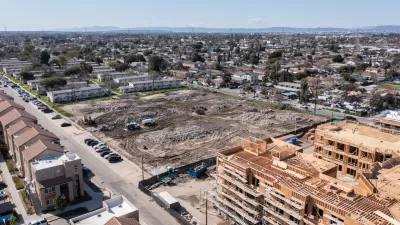Real estate developers around the country are converting old single-family homes into “culinary hubs,” reports The New York Times.

According to an article in the New York Times by Arielle Paul, repurposing single-family homes into micro restaurants or “culinary hubs” is a growing trend nationally. “From Los Angeles to Nashville, developers are transforming clusters of old homes into walkable culinary hubs for the surrounding high-density neighborhoods,” Paul reports. Advocates of this new use say it’s an excellent reuse of blighted properties, “sustainably preserving the homes while serving the economic needs of the neighborhood.” But critics are concerned about the loss of affordable housing and potential gentrification and displacement of existing communities.
Paul points out that conversion of historic homes into restaurants is not new. There are famous restaurants around the country that are located in what were once homes. She spoke to real estate and architecture experts that said only certain houses would meet the criteria such as foot traffic to successfully convert to restaurants and that these types of homes would provide affordable, lower-square-foot commercial spaces for start-ups and small businesses.
Stuart A. Gabriel, a finance professor and the director of the Ziman Center for Real Estate at the University of California, Los Angeles, told the New York Times reporter, that the loss of homes might not be significant enough to move the needle on the housing shortage at large and that he is concerned about potential displacement of families. “On the other hand, there are a whole set of positives in terms of amenities and services, and then improvements, property values and equity gains for the people who actually own housing there,” he said.
FULL STORY: Culinary Hubs Put a Twist on Home Cooking

Alabama: Trump Terminates Settlements for Black Communities Harmed By Raw Sewage
Trump deemed the landmark civil rights agreement “illegal DEI and environmental justice policy.”

Study: Maui’s Plan to Convert Vacation Rentals to Long-Term Housing Could Cause Nearly $1 Billion Economic Loss
The plan would reduce visitor accommodation by 25% resulting in 1,900 jobs lost.

Planetizen Federal Action Tracker
A weekly monitor of how Trump’s orders and actions are impacting planners and planning in America.

Wind Energy on the Rise Despite Federal Policy Reversal
The Trump administration is revoking federal support for renewable energy, but demand for new projects continues unabated.

Passengers Flock to Caltrain After Electrification
The new electric trains are running faster and more reliably, leading to strong ridership growth on the Bay Area rail system.

Texas Churches Rally Behind ‘Yes in God’s Back Yard’ Legislation
Religious leaders want the state to reduce zoning regulations to streamline leasing church-owned land to housing developers.
Urban Design for Planners 1: Software Tools
This six-course series explores essential urban design concepts using open source software and equips planners with the tools they need to participate fully in the urban design process.
Planning for Universal Design
Learn the tools for implementing Universal Design in planning regulations.
Caltrans
Smith Gee Studio
Institute for Housing and Urban Development Studies (IHS)
City of Grandview
Harvard GSD Executive Education
Toledo-Lucas County Plan Commissions
Salt Lake City
NYU Wagner Graduate School of Public Service





























